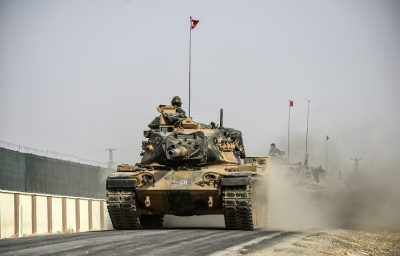What the Idlib Deal Means for the Syrian War

While a crisis has been prevented in Idlib through a deal between Russia and Turkey, the deal in itself also contains sufficient substance that brings America’s role in Syria down to zero. This becomes particularly evident when we compare the same kind of deals made regarding Aleppo in 2016 when the US was a party to it and its officials did sit across the table from their Russian counterparts. But the Idlib deal saw no US officials, marking the continuing exit of US influence from the region, particularly its role in influencing the Syrian end-game. With Idlib being the last major terrorist stronghold in Syria and with the US having no say in it, there is little gainsaying that the US will have little to no say on the final outcome of the war it had orchestrated 6 years ago.
While it is also a fact that America’s exit from Syria was partly due to its own reluctance and inability to deepen its military involvement, and its heavy reliance on proxy groups to serve the US interest, there remains little doubt about the importance of Russian military’s involvement in Syria as the deciding factor, defeating not only the “rebels” but also insulating Syria from the US influence.
The deal also means the final exit of all foreign funded “rebels”, which had been the main ground force for the advocates of “Assad must go.” As Erdogan confirmed,
“we will ensure that radical groups, which we will designate together with Russia, won’t be active in the relevant area.”
While western political pundits have been pointing out as to how this deal could fail like the many deals made in the past, this analysis does hardly take into account how Russia-Turkey relations have already changed into strong enough ties to fulfill these deals. Turkey and Russia are increasingly becoming trade and diplomatic partners, and Russia is building Turkey’s first nuclear reactor. On top of it is the fact that Turkey’s own relations with the US and EU countries aren’t strong enough to allow for greater protection of its interests in and outside Syria.
For the US, however, the deal means that there will not be any serious military escalation, certainly not serious enough to allow for another staged chemical attack and thus use that attack to launch yet another missile strike on Syria and use this trick as an excuse to increase the stakes and get a chance to have a seat on Sochi and Astana processes. As it stands, chance of having itself present in Syria is a lost game for the US.
With this deal, chances of direct military confrontation between Russia and Turkey or between Turkey and Syria have also significantly scaled down, allowing Russia to not only to keep Turkey on its own side of the war but also keep the Sochi and Astana processes intact. This way, Russia has made sure that Turkey finds no reason to normalize its relations with the West.
That the Sochi and Astana processes remain alive is evident from the fact that the deal has been called “Sochi deal” and the other member of the processes, Iran, has also hailed it as a great diplomatic success. Keeping these processes alive is significant for Russia not only because it gives Russia a very crucial diplomatic edge over its western competitors, but also because it legitimizes its presence in Syria to engage with Turkey and other countries, including Israel, to protect both Syrian and Russian interests.
And while the deal has already received support from countries like Germany and even received a cautious support from the UNO, Russia has nothing to lose out of it even if it fails. For one thing, majority of the tasks laid out in the deal fall on Turkish rather than Russian shoulders. The crucial question was of how to convince their respective partners of the deal.
While Russia has already convinced Syria, it remains to be seen how Turkey would convince the opposition armed groups, which include Islamist radicals of former Al-Nusra front now called Tahrir al-Sham, to withdraw from the province. And, even If Turkey fails to do so and instead ends up having to launch a military operation against the radicals, Turkey will still have to rely on Russia to obtain its permission to use Syria’s airspace for its fighter jets to do air strikes. During the Afrin operation, Moscow initially allowed the Turkish air force to operate above Afrin and then disallowed it.
Convincing or even forcing the rebels and the radicals is, therefore, a crucial task that Turkey has to perfume. If it succeeds in doing so, it will make Idlib’s return to Syria’s control relatively peaceful; if it fails, Turkey will hardly be in any position to ask for another deal, leaving the ground open for the Syrian and Russian military to clear Idlib through hard military means.
*
Note to readers: please click the share buttons above. Forward this article to your email lists. Crosspost on your blog site, internet forums. etc.
Salman Rafi Sheikh is research-analyst of International Relations and Pakistan’s foreign and domestic affairs, exclusively for the online magazine “New Eastern Outlook”.
Featured image is from the author.

